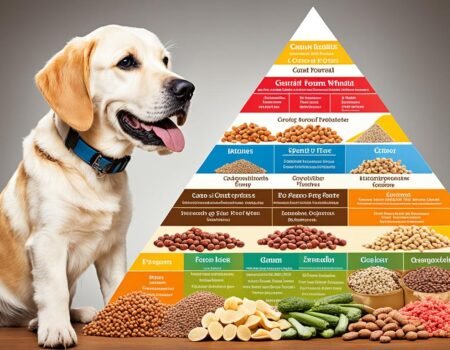As a dog owner, I’ve experienced the heartbreak of seeing my furry companion suffer from allergies. Watching them scratch incessantly, deal with red and irritated skin, and struggle with digestive issues can be incredibly distressing. I’ve tried various remedies and diets over the years, searching for a solution that would provide relief and improve their quality of life.
That’s when I discovered the power of high-protein dog food for allergy management. I was amazed at how this simple dietary change made a significant difference in their overall well-being. Not only did it help alleviate their allergy symptoms, but it also boosted their energy levels and enhanced their coat’s health.
If you’re facing a similar situation with your beloved furry friend, I want you to know that you’re not alone. Dealing with dog allergies can be challenging, but there is hope. In this article, I will share valuable insights into high-protein dog food and its role in allergy management, guiding you towards finding the best solution for your furry companion’s specific needs.
Key Takeaways:
- High-protein dog food can be an effective way to manage allergies and improve your dog’s overall well-being.
- Consult with a veterinarian to diagnose your dog’s food allergies and conduct a dietary elimination trial.
- Common food allergens for dogs include chicken, beef, wheat, soy, and dairy.
- Consider options like limited ingredient diets, vegetarian diets, novel proteins, and hydrolyzed diets for allergy management.
- Choosing the best dog food for allergies involves reading ingredient lists and selecting a high-quality protein source as the primary component of the food.
How to Choose the Best Dog Food for Allergies
When it comes to finding the best dog food for allergies, there are a few key factors to consider. One important step in the process is conducting a dietary elimination trial to identify specific allergens that may be causing your dog’s symptoms. This trial involves removing potential allergens from your dog’s diet and then gradually reintroducing them to pinpoint the culprit.
Common food allergens for dogs include chicken, beef, wheat, soy, and dairy. By eliminating these ingredients from your dog’s diet one at a time, you can determine which ones are triggering allergic reactions.
Reading ingredient lists is crucial in selecting the right food for your dog. Look for a high-quality protein source as the primary component of the food. This could be a novel protein like venison or kangaroo, which are less likely to cause allergic reactions. Avoid foods that contain fillers, artificial additives, or excessive amounts of grains.
Consulting with a veterinarian is essential throughout this process. They can help guide you in choosing the best dog food for allergies and provide expert advice on managing your dog’s specific dietary needs.
I’ve found that conducting a dietary elimination trial, carefully reading ingredient lists, and working closely with my veterinarian has helped me choose the best dog food for my furry friend with allergies. It’s made a significant difference in his overall health and well-being.
Here’s a helpful table summarizing the common food allergens for dogs:
| Allergen | Prevalence |
|---|---|
| Chicken | High |
| Beef | High |
| Wheat | Moderate |
| Soy | Moderate |
| Dairy | Low |
By understanding your dog’s specific dietary needs and working closely with a veterinarian, you can choose the best dog food for allergies and help improve your furry friend’s health and quality of life.
Limited Ingredient Diet for Allergy Management
A limited ingredient diet can be a game-changer when it comes to managing your dog’s allergies. These diets are specifically designed to contain a main protein source and a minimal number of additional ingredients, making it easier to test and identify potential allergens while providing balanced nutrition. By avoiding known allergens and introducing novel protein sources, limited ingredient diets offer a safe and effective approach to allergy management in dogs.
One notable option in the limited ingredient diet category is the ACANA Singles Limited Ingredient Diet Pork & Squash Recipe. This high-quality dog food features a novel protein source – pork – along with a small selection of other key ingredients. The limited ingredient list helps reduce the risk of triggering allergic reactions, making it an excellent choice for dogs with known food sensitivities.
“A limited ingredient diet simplifies the process of identifying and avoiding known allergens in your dog’s food. By offering a carefully curated selection of key ingredients, these diets provide a safe and effective way to manage allergies and improve your dog’s overall health and well-being.” – Dr. Sarah Thompson, Veterinary Nutritionist
When implementing a limited ingredient diet for allergy management, it is important to consult with your veterinarian. They can help you determine the best protein sources to introduce and guide you through the process of transitioning your dog to a new diet.
Benefits of a Limited Ingredient Diet for Allergy Management
A limited ingredient diet offers several key benefits when it comes to managing allergies in dogs:
- Easy allergen identification: With a limited number of ingredients, it is easier to identify and isolate potential allergens.
- Avoidance of known allergens: By steering clear of common allergens like chicken, beef, and grains, you can help reduce the risk of triggering allergic reactions in your dog.
- Novel protein sources: Limited ingredient diets often feature novel protein sources, such as pork, which can be beneficial for dogs with allergies to more common proteins.
- Simplified diet: The simplicity of a limited ingredient diet can aid in the digestion and absorption of nutrients, promoting better overall health.
By incorporating a limited ingredient diet into your dog’s allergy management plan, you can provide them with a well-rounded and nutritionally balanced meal while minimizing the risk of allergic reactions.
Vegetarian Diet for Allergy Management
Some allergy-prone dogs may benefit from a vegetarian diet. While it is relatively rare for dogs to have negative reactions to multiple animal proteins, a vegetarian dog food that uses pumpkin and sweet potatoes as the main ingredients can be a healthy alternative. However, it is important to consult with a veterinarian to ensure the diet meets the nutritional needs of the dog, especially for puppies.
A vegetarian diet for dogs can provide an alternate protein source and help manage allergies. By eliminating animal proteins that may trigger allergic reactions, this diet can be a suitable option for dogs with specific sensitivities. The use of pumpkin and sweet potatoes as the main ingredients offers a nutritious and easily digestible alternative.
While a vegetarian diet can be beneficial for some dogs with allergies, it is essential to consult with a veterinarian before making any dietary changes. They can provide guidance on the optimal nutritional balance and supplement any potential deficiencies that may arise from a vegetarian diet. Additionally, puppies have specific nutritional requirements for growth and development, so professional advice is crucial.
“A vegetarian dog food that uses pumpkin and sweet potatoes as the main ingredients can be a healthy alternative.”
Introducing a vegetarian diet for dogs with allergies should be a carefully considered decision. The diet should be balanced to ensure it provides all the necessary nutrients for the dog’s overall health and well-being. A veterinarian can guide dog owners in choosing the right vegetarian dog food that meets these requirements.
Benefits of a Vegetarian Diet for Allergy Management:
- Elimination of common allergenic animal proteins
- Pumpkin and sweet potatoes as nutritious alternatives
- Potential reduction in allergy symptoms
- Improved digestion and nutrient absorption
- Possible weight management benefits
- Eco-friendly and sustainable option
While a vegetarian diet can be an effective allergy management strategy for some dogs, it may not be suitable for all. It is essential to consider individual dietary needs and thoroughly discuss the options with a veterinarian before implementing any changes.
| Vegetarian Dog Food Brand | Main Ingredients | Additional Benefits |
|---|---|---|
| Hill’s Science Diet Vegetarian Dry Dog Food | Brown rice, soybean meal, cracked pearled barley, pea protein | Enriched with vitamins and minerals, suitable for adult dogs |
| Natural Balance Vegetarian Formula Dry Dog Food | Brown rice, oats, pearled barley, peas, potatoes | Contains essential omega-3 and omega-6 fatty acids |
| Wild Earth Vegan High-Protein Formula | Pea protein, oat flour, chickpeas, sweet potato, yeast | Plant-based protein blend, no artificial preservatives |
Novel Proteins for Allergy Management
If your dog is allergic to common animal proteins like poultry, beef, lamb, and pork, introducing novel proteins can be a solution. Novel proteins are proteins that the dog has never had before, such as salmon, rabbit, pheasant, alligator, kangaroo, goat, bison, and venison. These protein sources are often healthy options that are rarely allergens for dogs.
“Novel proteins can provide unique nutritional benefits for dogs with allergies. By introducing novel protein sources into their diet, we can help alleviate their symptoms and improve their overall well-being.”
Salmon is a rich source of omega-3 fatty acids, which can help reduce inflammation and support a healthy coat and skin. Rabbit meat is lean and easily digestible, making it an excellent option for dogs with food sensitivities. Pheasant offers a novel taste and is a good source of vitamins and minerals.
Alligator is a low-allergenic protein source that provides essential nutrients like omega-3 fatty acids and vitamin B12. Kangaroo meat is lean, high in protein, and offers a novel taste experience. Goat meat is highly digestible and rich in iron and zinc. Bison is a lean protein option that is hypoallergenic and packed with nutrients. Venison is not only a novel protein source but also low in fat and a great source of B vitamins.
Benefits of Novel Proteins:
- Reduced risk of allergies: Novel proteins are less likely to trigger allergic reactions in dogs with food sensitivities.
- Improved digestion: Novel proteins are often more digestible, making them easier on the digestive system.
- Diversified nutrient profiles: Each novel protein source offers a unique combination of vitamins, minerals, and amino acids, providing a varied nutrient profile for your dog.
- Novel taste experience: Introducing new tastes can prevent taste fatigue and make mealtime more enjoyable for your dog.
When introducing novel proteins into your dog’s diet, it is important to do so gradually and monitor for any adverse reactions. If you suspect your dog has food allergies, consult with a veterinarian for proper diagnosis and guidance on the best diet for allergy management.
Comparison of Novel Protein Sources
| Protein Source | Key Benefits |
|---|---|
| Salmon | Rich in omega-3 fatty acids for healthy skin and coat |
| Rabbit | Lean and easily digestible; ideal for dogs with food sensitivities |
| Pheasant | Offers a novel taste and provides essential vitamins and minerals |
| Alligator | Low-allergenic protein source with omega-3 fatty acids and vitamin B12 |
| Kangaroo | Lean protein option with a unique taste experience |
| Goat | Highly digestible and rich in iron and zinc |
| Bison | Lean and hypoallergenic protein packed with nutrients |
| Venison | Novel protein source, low in fat, and a good source of B vitamins |
Hydrolyzed Diet for Allergy Management
In some cases, a veterinarian may recommend a hydrolyzed diet as part of an allergy management plan for your dog. This specialized diet involves breaking down proteins, including common ones like chicken, into small pieces that the body no longer recognizes as allergens. By breaking down the proteins, the hydrolyzed diet helps to minimize allergic reactions and effectively manage your dog’s allergies.
“A hydrolyzed diet can be a game-changer for dogs with food allergies. By breaking down the proteins into small particles, we can reduce the chance of an allergic reaction and provide relief for our furry friends.” – Dr. Sarah Brown, DVM
Hydrolyzed diets are designed to be easy to digest and are often formulated with high-quality ingredients that are less likely to trigger allergies. These diets are typically available in both dry and wet forms, giving you options to suit your dog’s preferences.
It’s important to note that a hydrolyzed diet for allergy management should be prescribed and monitored by a veterinarian. They will provide guidance on the appropriate duration and feeding instructions for your dog.
By incorporating a hydrolyzed diet into your dog’s allergy management plan, you can help reduce their symptoms and improve their overall quality of life.
Benefits of Hydrolyzed Diet for Allergy Management
A hydrolyzed diet offers several benefits for dogs with food allergies:
- Reduced risk of allergic reactions: The breakdown of proteins in a hydrolyzed diet makes them less likely to trigger an allergic response in dogs.
- Improved digestion: The hydrolyzed proteins are easier for dogs to digest, promoting better absorption of nutrients.
- Elimination of allergens: By using proteins that have been hydrolyzed, common allergens can be effectively removed from the diet, minimizing the risk of allergic reactions.
- Support for skin health: Allergies can often manifest as skin issues in dogs. The hydrolyzed diet helps to address these issues and promote healthier skin and coat.
Overall, a hydrolyzed diet is a valuable tool in the allergy management arsenal, providing relief and improving the well-being of dogs with food allergies.
| Brand | Product | Description |
|---|---|---|
| Hill’s Prescription Diet | Z/D Ultra Allergen-Free Dog Food | A hydrolyzed protein diet specifically formulated for dogs with food sensitivities and allergies. |
| Purina Pro Plan Veterinary Diets | HA Hydrolyzed Dog Food | A highly digestible hydrolyzed protein diet for dogs with food allergies and gastrointestinal issues. |
| Royal Canin Veterinary Diet | Hydrolyzed Protein Canine | A complete and balanced hydrolyzed protein diet with specially selected ingredients to support digestive health. |
Best Dog Foods for Allergies
When it comes to finding the best dog food for allergies, there are several highly recommended options that can help your furry friend find relief. Whether your dog suffers from skin allergies or has a chicken allergy, these dog foods are specially formulated to cater to their specific needs.
“The right dog food can make a world of difference for dogs with allergies.”
1. Instinct Raw Boost Grain-Free Recipe with Real Salmon
This top pick is an excellent choice for dogs with skin allergies. It features real salmon as the main protein source, providing a high-quality and allergy-friendly option. Additionally, this recipe is enriched with omega-3 and omega-6 fatty acids, which are essential for maintaining healthy skin and a shiny coat.
2. ACANA Singles Limited Ingredient Diet Pork & Squash Recipe
If your dog has a chicken allergy, this limited ingredient diet is a great alternative. Made with a novel protein source – pork – and a small number of additional ingredients, this recipe simplifies your dog’s diet and helps avoid known allergens. The inclusion of squash provides additional nutrients and fiber for a well-rounded meal.
3. Merrick Limited Ingredient Diet Grain-Free Real Lamb Recipe
If you prefer feeding your dog canned food, this lamb recipe from Merrick is a top choice. It is made with real lamb as the primary protein source and contains a limited number of ingredients, making it suitable for dogs with allergies. This grain-free recipe ensures easy digestion and provides essential nutrients for optimal health.
4. GO! Solutions Sensitivities Limited Ingredient Grain-Free Turkey Recipe
For those on a budget, this grain-free turkey recipe offers a budget-friendly option that does not compromise on quality. It is formulated with limited ingredients, including turkey as the main protein source, to cater to dogs with allergies. This recipe is free from grains, gluten, and common allergens, providing a gentle and balanced diet for sensitive dogs.
These top dog foods for allergies have been carefully selected to address specific dietary needs, whether it’s for skin allergies or chicken allergy management. Always consult with your veterinarian to determine the best option for your dog’s unique situation.
Dog Food Allergy Symptoms and Diagnosis
When it comes to dog food allergies, recognizing the symptoms is crucial for proper diagnosis and treatment. The most common food allergens that affect dogs include beef, chicken, lamb, and wheat. If your furry friend is experiencing any of the following symptoms, they may have a food allergy:
- Redness and itchiness of the skin
- Ear problems
- Foot chewing
- Hair loss
- Chronic skin infections
Dogs cannot undergo the same kind of testing for food allergies as humans do. As a result, diagnosing a food allergy in dogs requires a dietary elimination trial or an elimination diet. This involves eliminating potential allergens from their diet and reintroducing them one by one to identify the culprits.
Proper diagnosis and treatment are best handled by consulting with a veterinarian. They can provide guidance on conducting an elimination diet trial and recommend suitable dog food options for allergy management.
By identifying and eliminating the specific allergens causing the problem, you can help your furry friend find relief and improve their overall well-being. Remember, consulting with a veterinarian is crucial for accurate diagnosis and the proper management of dog food allergies.
Conclusion
High-protein dog food is an excellent choice for managing allergies in dogs. By selecting the right diet, such as limited ingredient diets, novel proteins, vegetarian options, or hydrolyzed diets, we can provide relief for our furry friends. It is crucial to consult with a veterinarian for a proper diagnosis and personalized guidance in selecting the best diet for allergy management.
Opting for high-protein dog food has numerous benefits. It ensures that our dogs receive the necessary nutrients while avoiding common allergens. This type of diet can improve skin health and overall well-being, helping our dogs thrive even with allergies.
When it comes to choosing the right high-protein dog food, there is no one-size-fits-all solution. Every dog is unique, and their dietary needs may vary. That’s why it is essential to work closely with a veterinarian to create a customized plan. Whether it’s through a limited ingredient diet, novel proteins, vegetarian options, or hydrolyzed diets, we can find the best diet for our dog’s specific allergy management needs.
FAQ
What is high-protein dog food and how does it help with allergy management?
High-protein dog food refers to a diet that contains a higher percentage of protein compared to other nutrients. This type of food can help with allergy management by providing essential nutrients while minimizing potential allergenic ingredients like grains and common animal proteins.
How do I choose the best dog food for allergies?
To choose the best dog food for allergies, it is important to conduct a dietary elimination trial to identify specific allergens. Common food allergens for dogs include chicken, beef, wheat, soy, and dairy. Reading ingredient lists and choosing a high-quality protein source as the primary component of the food is advisable. Consulting with a veterinarian is essential for proper diagnosis and guidance.
What is a limited ingredient diet and how does it help with allergy management?
A limited ingredient diet is a helpful option for allergy management. These diets contain a main protein source and a small number of additional ingredients, making it easier to test a new protein source and avoid known allergens. Ingredients like ACANA Singles Limited Ingredient Diet Pork & Squash Recipe provide a novel protein source and can be beneficial for dogs with allergies.
Can a vegetarian diet be a good option for managing allergies in dogs?
Some allergy-prone dogs may benefit from a vegetarian diet. While it is relatively rare for dogs to have negative reactions to multiple animal proteins, a vegetarian dog food that uses pumpkin and sweet potatoes as the main ingredients can be a healthy alternative. However, it is important to consult with a veterinarian to ensure the diet meets the nutritional needs of the dog, especially for puppies.
What are novel proteins and how do they help with allergy management?
If a dog is allergic to common animal proteins like poultry, beef, lamb, and pork, introducing novel proteins can be a solution. Novel proteins are proteins that the dog has never had before, such as salmon, rabbit, pheasant, alligator, kangaroo, goat, bison, and venison. These protein sources are often healthy options that are rarely allergens for dogs.
What is a hydrolyzed diet and how does it help with allergy management?
In some cases, a veterinarian may recommend a hydrolyzed diet for allergy management. A hydrolyzed diet involves breaking down the protein, even common ones like chicken, into small pieces that the body no longer recognizes as an allergen. This can help reduce allergic reactions and manage allergies effectively.
What are some highly recommended dog foods for allergies?
Several dog foods are highly recommended for allergies. Instinct Raw Boost Grain-Free Recipe with Real Salmon is a top pick for skin allergies and features omega-3 and omega-6 fatty acids for skin and coat health. ACANA Singles Limited Ingredient Diet Pork & Squash Recipe is a great option for dogs with chicken allergies. Merrick Limited Ingredient Diet Grain-Free Real Lamb Recipe is a top choice for canned dog food. GO! Solutions Sensitivities Limited Ingredient Grain-Free Turkey Recipe is a budget-friendly option for allergies.
What are the common symptoms of dog food allergies and how are they diagnosed?
Common symptoms of dog food allergies include redness and itchiness of the skin, ear problems, foot chewing, hair loss, and chronic skin infections. The most common food allergens in dogs are beef, chicken, lamb, and wheat. Dogs cannot be tested for food allergies like humans, so diagnosing a food allergy requires a dietary elimination trial or an elimination diet. Consulting with a veterinarian is crucial for proper diagnosis and treatment.
How can high-protein dog food benefit dogs with allergies?
High-protein dog food can be beneficial for managing allergies in dogs. Choosing the right diet involves considering factors like limited ingredient diets, novel proteins, vegetarian options, and hydrolyzed diets. It is important to consult with a veterinarian for proper diagnosis and guidance in selecting the best diet for allergy management. By providing the necessary nutrients and avoiding allergens, high-protein dog food can help improve skin health and overall well-being for dogs with allergies.










No Comment! Be the first one.